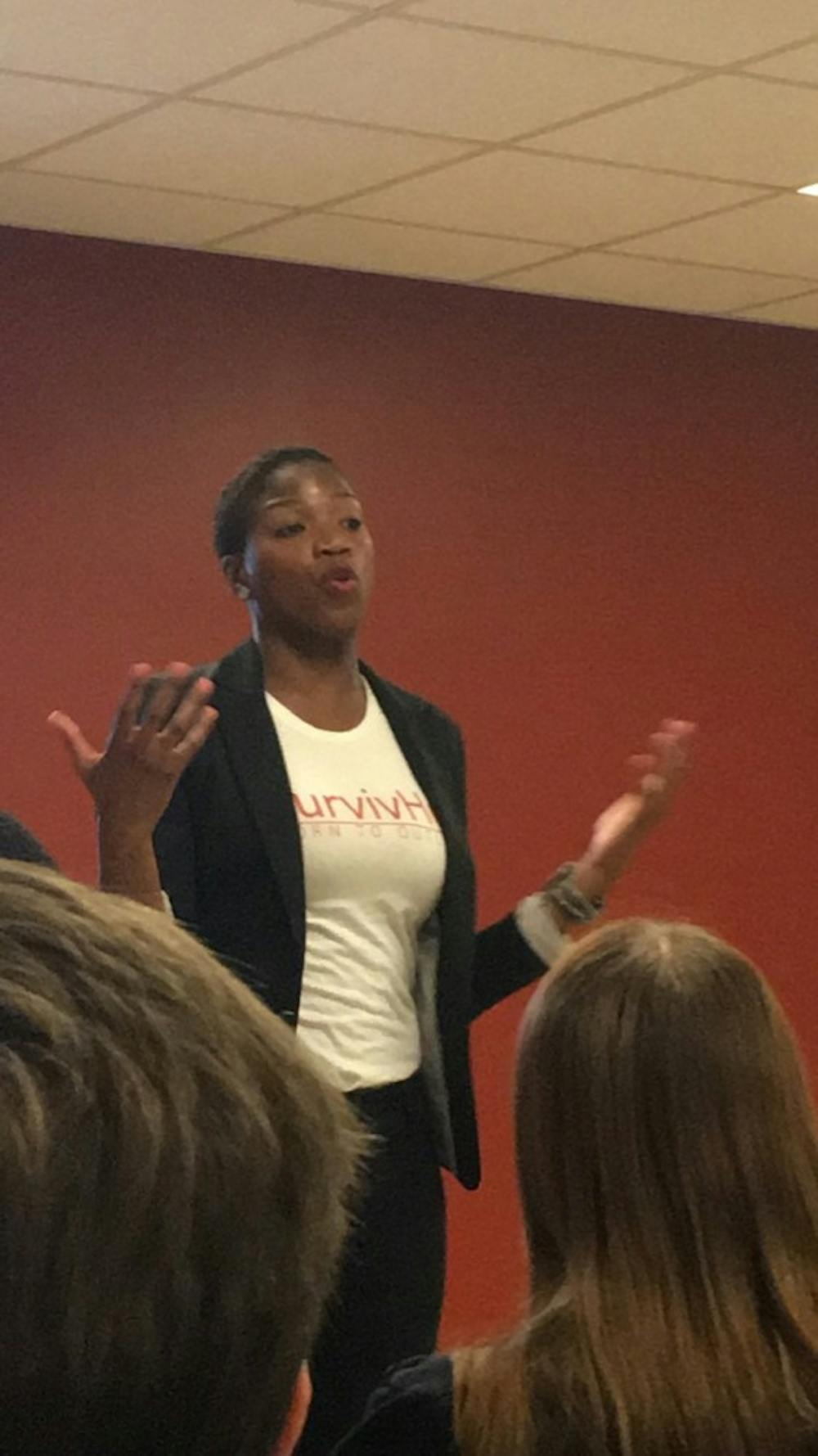Research conducted by the National Alliance on Mental Illness on mental health on college campuses shows that:
- One in four students have a diagnosable illness
- 40 percent do not seek help
- 80 percent feel overwhelmed by their responsibilities
- 50 percent have been so anxious they struggled in school
Mental health, one of the Student Government Association’s platform points, was featured in an event aiming to erase the stigma Nov. 14.
The event, co-sponsored by Active Minds, Peer Health Educators, Alive and Peer Victim Advocates, started with a presentation from the Counseling and Health Centers before Katie Johnson, a 2010 Ball State alumna, spoke.
Johnson, a first-generation college student, remembers getting dropped off to start her freshman year with not only her items for the school year but also emotional baggage, such as going through homelessness and sexual abuse when she was younger.
To help ease the stress of college with her mental health, Johnson turned to the Counseling Center.
“I have a résumé of several things that I’ve experienced, whether it's being a college student, being an athlete, studying abroad, but there are some key things that while I was here at Ball State literally changed my life. One of those things was the Counseling Center,” Johnson said. “In my family, as a black woman we were taught be strong, pull your boots up, tie your shoes and whatever problems you’re having, get over it and get moving.”
Johnson said not having time off or to time take a break worsened her mental health issues.
“When you don’t take time to relax, you don’t take time to reflect on what you’re going through — it causes problems,” Johnson said. “Every single person has issues. I don’t care if you come from a family where your parents are married and they’re always smiling, there’s something in your life that could hinder you from being the best version of yourself … from being the happiest version of yourself, from being the nicest version of yourself.”
Despite these issues, Johnson said people have a choice in how they handle these issues and people become a survivor of their circumstances. She couldn’t get through her past sexual abuse by herself and that's where the guidance from the Counseling Center changed her life.
“I didn’t have to get through that by myself. There was someone there who wasn’t judging me, there was someone there who wasn’t trying to tell me I was wrong for feeling the way that I was feeling, they were just a listening ear and they also gave me tools,” she said.
Johnson met her best friend and future roommate during her freshman year. Both of them were going to the Counseling Center at the same time, but Johnson didn’t find out her roommate had also gone until last year.
“The stigma is so real that mental health is this bad thing that you cannot have, that you cannot talk about ... we were that ashamed,” Johnson said. “We don’t have to be ashamed to ask for help.”
After Johnson’s speech, attendees were divided into four groups based off the small groups offered by the Counseling Center: relationships, stress management, depression and self-esteem. Four students, one in each group, shared their stories about mental health.
Junior legal studies and political science major Rebecca Musal was one of the four students who shared her story of being diagnosed and living with bipolar disorder.
"One of the things we talked a lot about before we went to college is just how exciting that new transition is. You hear about how you're getting ready to go and start your life and you're gonna get a job and you're gonna be able to do all these things in college, like study abroad," Musal said. "One thing that nobody told me was that late teen and adolescent time is when you start seeing a lot of really serious mental health conditions developing."
The second semester of her freshman year, Musal said "things just started going really wrong."
"I started having really intense panic attacks, I started having these swings where I could stay up for 48 hours straight, no problem. I wasn't tired ... and I couldn't figure out what the problem was," she said.
All of her commitments didn't help Musal focus on her health and as a result, she was hospitalized a couple times and eventually received her diagnosis of bipolar type 2, which means she can have "really happy or really bad days."
"The best way to describe it for somebody who doesn't know what it's like is you wake up and you do not know if Tigger or Eeyore is gonna be running your day and there's a lot of frustrations when you get that diagnosis," she said. "Once you come to terms with it yourself, it's like OK, this is something I have to deal with, I can deal with it, what are people gonna think about me? I think that's the biggest frustration for a lot of people or the biggest fear for people about coming out and saying 'I need help, I need to talk to someone.'"
Musal didn't want people to know she was struggling because she likes to handle her own problems, which became a problem.
"That was probably my biggest issue of being able to get over feeling like this was something that I could move on with for the rest of my life ... not only do you not want to look weak ... I didn't want people to think less of me, and it was also the fear of being labeled as something that I'm not," she said.
Musal told one friend about her diagnosis and she asked Musal if she would let her know when she wanted to kill her, because the friend associated being bipolar with homicidal thoughts.
"It was one of the moments that I realized there's a lot of people that don't understand the specificities of serious mental conditions," Musal said. "We're still people, we still have emotions just like you. It's just that our neurotransmitters like to screw with us a little more than they should or our body doesn't like to produce as much neurotransmitters as they should."
Emily Halley, SGA treasurer, said the point of hosting the event was for students to realize they aren’t alone in their struggles and to hear from individuals who have overcome obstacles so students had hope.
“Even if we only helped two students, those two students made this event worth it … this past semester, someone from back home, he took his own life [and] he went to Wabash College. I always wonder if his university had different events like this or if they talked more about mental health on their campus, if the situation would be a lot different," Halley said. "I hope that tonight we at least helped a few people and showed them that they’re not alone and there’s still hope and there’s a light at the end of the tunnel.”





